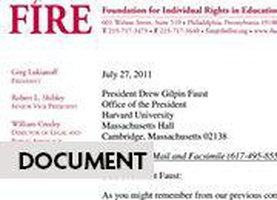It normally takes just a few minutes. But last week’s approval of the Summer School course catalog—which still included controversial Indian politician Subramanian Swamy on the teaching roster when it first came up for a vote—launched a lengthy discussion that has since spawned a vocal debate in the international media.
Members of the Faculty of Arts and Sciences, the largest school at Harvard, voted overwhelmingly at last Tuesday’s Faculty meeting to remove the two courses taught by Swamy at the Summer School.
The vote came in response to an article Swamy wrote in India in July, in which he advocated for the disenfranchisement of non-Hindus, destruction of hundreds of mosques in India, and the prohibition of conversion from Hinduism.
A majority of the Faculty at the meeting voted to remove Swamy’s classes, claiming that comments he made in the op-ed over the summer were an unacceptable incitement to violence against Muslims in India. But some professors are unsure what this decision might say about free expression at Harvard and question the precedent the decision sets for removing professors from the University based on their political views.
REMOVING SWAMY
Diana L. Eck, a professor of comparative religion and a scholar of Indian studies, led the decision to remove Swamy from the teaching roster, but she said she did not intend to become the face of a movement against him.
Eck was one of forty faculty members who signed a letter to University President Drew G. Faust and Summer School Dean Donald H. Pfister requesting that Harvard reconsider its appointment of teachers who “detract from the reputation of the university.” The letter was drafted by Ajantha Subramanian, an associate professor of anthropology and social studies, one month after Swamy’s op-ed was first published in the Indian newspaper Daily News and Analysis.
“We’re not in the business of trying to publicly shame or disparage Subramanian Swamy,” Eck said in an interview Sunday. “I think many of us imagined that this would be taken up by the Economics Department, and they would quietly drop these courses or find someone else to teach them.”
According to economics professor Claudia Goldin, an executive council of the Economics Department did broach the subject, which “received a lot of airtime.” But she said that after “a very open and frank discussion,” the members decided to include Swamy’s two courses in the 2012 summer course catalog sent to the Faculty Council.
The Faculty Council—which sets the agenda for the monthly FAS Faculty meetings—reviewed a copy of Swamy’s op-ed and Subramanian’s letter. After nearly half an hour of debate, the council voted unanimously to approve the catalog as it stood.
One week later, the Faculty met to discuss and officially approve the catalog at the December Faculty meeting, but, according to Eck, faculty members did not receive a copy of the course listings. Eck said she saw the meeting agenda the night before the meeting and realized that Swamy’s courses were still included in the Summer School catalog that would come up for approval the next day.
After contacting several other signatories of Subramanian’s letter—none of whom were aware that Swamy’s courses were still on the list—Eck drafted an amendment proposing that FAS approve the course catalog with the exception of Economics S-110 and Economics S-1136, Swamy’s two courses.
“It was really within an hour of the meeting,” she said, adding that she informed the secretary of the Faculty ahead of time of her intention to present the amendment.
AN ISSUE OF FREE SPEECH
Many publications in India and political supporters of Swamy—who leads India’s Janata party—have spoken out about Harvard’s reaction to Swamy’s op-ed in recent days. And in Cambridge, professors have expressed concern about the potential ramifications of the Faculty vote, worrying that it might set a precedent for censoring free speech at Harvard.
Read more in News
Fighting Pain with PainRecommended Articles
-
 In Letter to Harvard, Civil Liberties Group Cautions Against Swamy Investigation
In Letter to Harvard, Civil Liberties Group Cautions Against Swamy Investigation -
 Harvard Stands By Swamy, Writer of 'Distressing' Op-Ed
Harvard Stands By Swamy, Writer of 'Distressing' Op-Ed -
Harvard Economist Accused of 'Spreading Enmity Between Communities'While Harvard stands by its professors rights to free speech, India is not quite as tolerant of Harvard-educated economist Subramanian Swamy. Swamy has been charged with "spreading enmity" between India's Hindus and Muslims.
-
Faculty Talks Occupy, Free Speech, and Holiday BrowniesTuesday’s Faculty Meeting—the last of the calendar year—had not one, but two impassioned discussions, forcing faculty members into the first vote on a motion in the past year.
-
Faculty Cancel Controversial Summer School Instructor's Courses, Debate Reaction to 'Occupy'At Tuesday's Faculty Meeting, faculty members challenged the University's response to Occupy Harvard and voted to remove two summer economics courses taught by controversial Indian politician Subramanian Swamy from the course catalog.
-
So Long SwamySwamy has shown himself to be unfit to be a member of the Harvard community, and we are thrilled that he will not be teaching this summer.













